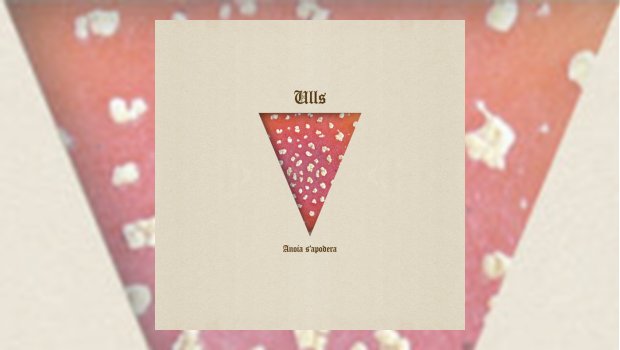The debut release from Ulls crashes into being with a glorious sound reminiscent of King Crimson’s 21st Century Man, but warmer and less edgy. In fact, what King Crimson might have sounded were they a rock progressivo Italiano band. If you didn’t know any better, apart from having far better production, this could have been an RPI release from the ‘70s. Well, so long as you didn’t recognise it isn’t Italian being sung. Truth be told, I probably wouldn’t even have noticed that, as I’m far from being a polyglot. For all I know, it is Italian being sung – but I presume it is either Spanish or Catalan. Regardless, this is a great opening track to draw one into the album and begin the journey David Trillo wishes to take us on.
For Ulls is not a band, so much as a one-man endeavour from multi-instrumentalist Trillo – and he’s quite clearly a talented musician, as every instrument is played extremely well. At about the two-minute mark of opening track Corona D’Or, the song shifts from the Crimsonesque, to a quite beautiful bridge, and half a minute or so later we find that Trillo has a very pleasant singing voice, too. After a return to the sound the song began with, it ends with a beautiful and delicate folk-like flourish that I assume might be Catalan. With a title translating, I assume, as ‘Golden Crown’, I have to wonder if this is a titular reference to how much influence King Crimson has given to the song. He may be a Crimson King, but it would seem he wears a Golden Crown. However, although Corona d’Or comes close to being derivative, it is definitely fresh and original enough to avoid feeling that way. As much as I like it, though, the best is yet to come, and Corona D’Or is my least favourite track on the album.
And for anyone who has any concerns that the rest of the album might continue treading the fine line of being derivative, these should soon be dissipated by the following Reig Bord. It’s a delightful wee ditty, with some great drumming to lead us in. The track is rhythm led throughout – if it’s not the drums taking centre stage, it’s the bass. As the album progresses, it becomes apparent that each track is longer than the preceding one, which really helps give a sense of a journey. It’s not a new trick, and it’s one I’ve come across often, but it rarely works as well as it does on this album. In recent times, the only other album I can think of where it gives such a feeling of distance travelled is oltreLuna by Progenie Terrestre Pura. I find myself enjoying myself further with each longer track. Basically, this album just gets better and better as you progress further through it. It also helps that such a variety of sound and style is used. I’ve mentioned Crimson and RPI, and to add to that you could chuck in some space rock and psychedelia, taking in not just obvious subjects like Pink Floyd and Hawkwind, but traversing musical geography from the Canterbury scene to Krautrock.
According to the Bandcamp, Anoia s’apodera is not only the first album from Ulls, but also the first of a series of albums depicting the story of a self-induced posthumous trip. I can’t help but wonder then about the possible twin meanings of ‘Anoia’ for the title. Anoia is a word across several languages which describes a state of extreme mental disfunction, or mindlessness. It can be a term used for the final stages of dementia. Anoia is also a Catalan river, and I’m unsure if anoia carries the same meaning in Catalan as it does in English – but if it does, it is easy to draw a comparison between Anoia, the river of mindlessness, and Lethe, the river of forgetfulness – one of the rivers one has to cross to make a posthumous trip in Ancient Greece. Without using Google translate, I have no idea what ‘s’apodera’ means, which means my interpretation could be way off. You’d think I might want to find out, but honestly, I enjoy the music too much to care. Sometimes it’s nice to just let yourself be taken away. And, this is an album that can do just that.
Anoia s’apodera ends with the almost quarter of an hour length La Ilum Eterna Tremola, which I’m going to take a guess translates as ‘The Eternal Light Trembles’. I know I could use Google translate, and maybe I should, but just as ‘Corona d’Or’ seemed obvious, so does this, and I’m lazy so I’ll stick with my translation. This final track is without doubt my favourite. It’s length allows it to develop and unfold its many textures and atmospheres. Indeed, it’s almost two songs, so distinct is the second half of the song from the first. It’s a gorgeously rich and ambitious piece full of understated nuance and ambience. Trillo shows he’s not just an accomplished musician but a great arranger. The first half of the song ends in a delicious burst of electronica à la Kraut, before the second half kicks in, eventually culminating in a symphonic finale.
If this is the first of a series of releases, I can’t wait to continue the trip. Let’s hope it’s not a posthumous one for me. In these days, none of us can take life for granted. In the meantime, you could do far worse than taking a journey with David Trillo…
TRACK LISTING
01. Corona D’Or (5:39)
02. Reig Bord (5:58)
03. El Fosser (9:15)
04. La Ilum Etera Tremola (14:39)
Total Time – 35:31
MUSICIANS
David Trillo – Everything
ADDITIONAL INFO
Record label – Independent
Country of Origin – Spain
Date of Release – 10th December 2019

